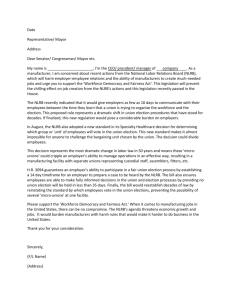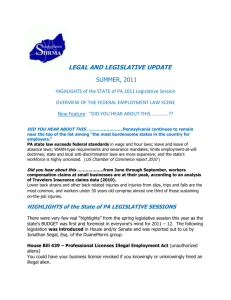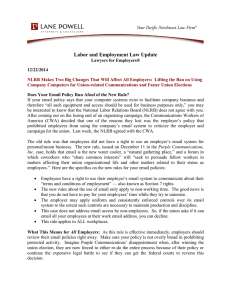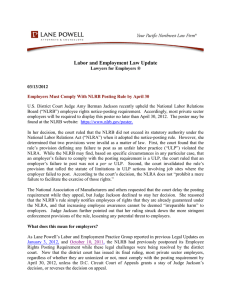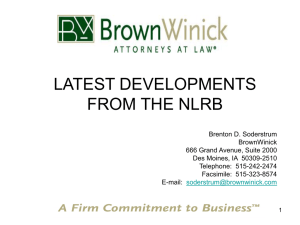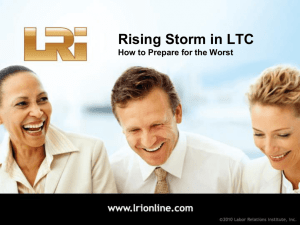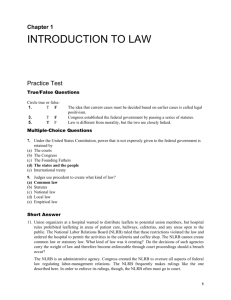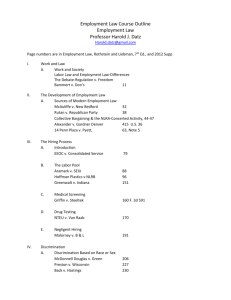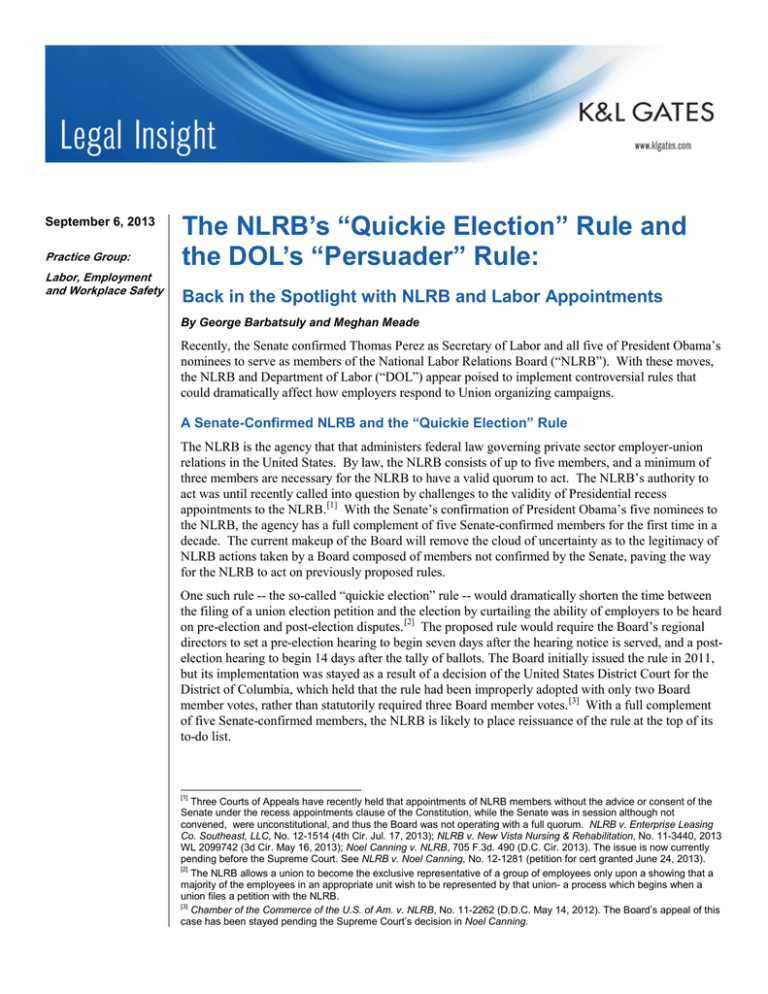
September 6, 2013
Practice Group:
Labor, Employment
and Workplace Safety
The NLRB’s “Quickie Election” Rule and
the DOL’s “Persuader” Rule:
Back in the Spotlight with NLRB and Labor Appointments
By George Barbatsuly and Meghan Meade
Recently, the Senate confirmed Thomas Perez as Secretary of Labor and all five of President Obama’s
nominees to serve as members of the National Labor Relations Board (“NLRB”). With these moves,
the NLRB and Department of Labor (“DOL”) appear poised to implement controversial rules that
could dramatically affect how employers respond to Union organizing campaigns.
A Senate-Confirmed NLRB and the “Quickie Election” Rule
The NLRB is the agency that that administers federal law governing private sector employer-union
relations in the United States. By law, the NLRB consists of up to five members, and a minimum of
three members are necessary for the NLRB to have a valid quorum to act. The NLRB’s authority to
act was until recently called into question by challenges to the validity of Presidential recess
appointments to the NLRB. [1] With the Senate’s confirmation of President Obama’s five nominees to
the NLRB, the agency has a full complement of five Senate-confirmed members for the first time in a
decade. The current makeup of the Board will remove the cloud of uncertainty as to the legitimacy of
NLRB actions taken by a Board composed of members not confirmed by the Senate, paving the way
for the NLRB to act on previously proposed rules.
One such rule -- the so-called “quickie election” rule -- would dramatically shorten the time between
the filing of a union election petition and the election by curtailing the ability of employers to be heard
on pre-election and post-election disputes. [2] The proposed rule would require the Board’s regional
directors to set a pre-election hearing to begin seven days after the hearing notice is served, and a postelection hearing to begin 14 days after the tally of ballots. The Board initially issued the rule in 2011,
but its implementation was stayed as a result of a decision of the United States District Court for the
District of Columbia, which held that the rule had been improperly adopted with only two Board
member votes, rather than statutorily required three Board member votes. [3] With a full complement
of five Senate-confirmed members, the NLRB is likely to place reissuance of the rule at the top of its
to-do list.
[1]
Three Courts of Appeals have recently held that appointments of NLRB members without the advice or consent of the
Senate under the recess appointments clause of the Constitution, while the Senate was in session although not
convened, were unconstitutional, and thus the Board was not operating with a full quorum. NLRB v. Enterprise Leasing
Co. Southeast, LLC, No. 12-1514 (4th Cir. Jul. 17, 2013); NLRB v. New Vista Nursing & Rehabilitation, No. 11-3440, 2013
WL 2099742 (3d Cir. May 16, 2013); Noel Canning v. NLRB, 705 F.3d. 490 (D.C. Cir. 2013). The issue is now currently
pending before the Supreme Court. See NLRB v. Noel Canning, No. 12-1281 (petition for cert granted June 24, 2013).
[2]
The NLRB allows a union to become the exclusive representative of a group of employees only upon a showing that a
majority of the employees in an appropriate unit wish to be represented by that union- a process which begins when a
union files a petition with the NLRB.
[3]
Chamber of the Commerce of the U.S. of Am. v. NLRB, No. 11-2262 (D.D.C. May 14, 2012). The Board’s appeal of this
case has been stayed pending the Supreme Court’s decision in Noel Canning.
The NLRB’s “Quickie Election” Rule and the DOL’s
“Persuader” Rule:
Back in the Spotlight with NLRB and Labor Appointments
The DOL’s Proposed “Persuader” Rule
While the expected quickie-election rules are likely to cause employers to actively engage counsel in
anticipation of Union organizing campaigns, another significant rule change proposed by the DOL
may have the effect of discouraging such communications.
The Labor Management Reporting and Disclosure Act (“LMRDA”) requires consultants hired to
influence employees not to unionize, or “persuaders,” to disclose all fees paid to and services provided
by them on a form filed with the DOL. Since the LMRDA’s passage in 1959, the DOL has interpreted
the statute as excluding lawyers’ fees from the disclosure requirement as long as the lawyers’ role was
to give “advice” to the employer only, and they did not deal directly with the employees considering
organization. Under the proposed new “persuader” rule, however, the “advice” excepted from
disclosure by Section 203 would be limited to “an oral or written recommendation regarding a
decision or course of action.” Consequently, as the DOL has explained, “reportable persuader
activities would include those which a consultant engages in any actions, conduct or communications
on behalf of an employer that would directly or indirectly persuade workers concerning their rights to
organize and bargain collectively, regardless of whether or not the consultant has direct contact with
workers.” [4] Therefore, any lawyer who works on a persuasive employee communication would be
considered a persuader, even where there is no direct contact between the lawyer and the employees.
And that lawyer’s fees, agreements, and services must be disclosed.
The proposed rule is concerning for several reasons. First, the scope of services which could fall
within the DOL’s definition of advice is vast. Potentially any employee communication drafted on
behalf of an employer could indirectly persuade workers concerning their right to unionize.
Specifically, the DOL has stated that reportable activities will include: [5]
• drafting, revising, or providing materials or communication of any sort, to an employer for
presentation, dissemination, or distribution to employees, directly or indirectly;
• developing or administering employee attitude surveys concerning union awareness, sympathy, or
“proneness”;
• training supervisors or employer representatives to conduct individual or group meetings designed
to persuade employees;
• coordinating or directing the activities of supervisors or employer representatives to engage in the
persuasion of employees;
• establishing or facilitating employee committees;
• developing employer personnel policies or practices designed to persuade employees;
• deciding which employees to target for persuader activity or disciplinary action; and/or
• coordinating the timing and sequencing of persuader tactics and strategies.
Reportable activity will also include supplying an employer with information concerning the activities
of employees or a labor organization in connection with a labor dispute, such as information obtained
from:
• research or investigation concerning employees or labor organizations;
[4]
“US Labor Department Announces Proposed Rule Concerning Reporting on Use of Labor Relations Consultants,” U.S.
DOL News Release, June 20, 2011, http://www.dol.gov/opa/media/press/olms/olms20110924.htm
[5]
http://www.laborrelationstoday.com/uploads/file/OLMSrevint.pdf
2
The NLRB’s “Quickie Election” Rule and the DOL’s
“Persuader” Rule:
Back in the Spotlight with NLRB and Labor Appointments
• supervisors or employer representatives;
• employees, employee representatives, or union meetings; and
• surveillance of employees or union representatives (video, audio, Internet, or in person).
Second, the disclosure requirements are onerous. In addition to disclosing the amount of fees paid to
the lawyers, employers must report the details of their agreements or arrangements with their labor
attorneys and the specific activities performed by the attorneys. The lawyers themselves must
disclose, as a matter of public record, all fees received from clients for all labor relations advice as
well as the identity of the clients. The Labor and Employment Section of the American Bar
Association has expressed the view that such disclosures are a clear intrusion into the attorney-client
privilege. [6] Furthermore, failure to abide by the LMRDA’s disclosure requirements can potentially
lead to criminal penalties. There is justifiable fear within the legal community that this rule will
discourage employers from seeking the advice of counsel when confronted with organization efforts,
leading to a greater number of, likely inadvertent, unlawful acts by the employers in the course of
union organizing campaign.
Although Secretary Perez offered only non-committal comments on the rule during his confirmation
process, experts within the labor community do not expect him to halt or materially change the
proposed rule. An even stronger indicator that the rule is once again a top priority is that the White
House Unified Agenda released on July 3 listed a November 2013 target implementation date for the
proposed rule. [7] Thus, barring further legal challenges, employers have every reason to expect this
rule to be finalized before the year is out.
Broad Rules with Broad Implications
The NLRB’s anticipated quickie election rule and the DOL’s persuader rule could have serious
consequences for employers confronted with a union organizing campaign. Employers naturally may
wish to turn to their attorneys for advice in dealing with the anticipated new election rules. However,
waiting to do so could trigger extensive disclosure requirements exposing the employer's previously
confidential strategizing with its counsel. Employers, therefore, should seek counsel now in order to
prepare for these and other expected pro-labor initiatives from the NLRB and the DOL.
[6]
Letter from William Robinson III, President, American Bar Association, to Andrew Davis, Chief of the Division of
Interpretations & Standards, Office of Labor-Management Standards (September 21, 2011)
[7]
http://www.reginfo.gov/public/do/eAgendaViewRule?pubId=201304&RIN=1245-AA03
3
The NLRB’s “Quickie Election” Rule and the DOL’s
“Persuader” Rule:
Back in the Spotlight with NLRB and Labor Appointments
Authors:
George P. Barbatsuly
George.barbatsuly@klgates.com
+1.973.848.4104
Meghan T. Meade
Meghan.meade@klgates.com
+1.973.848.4119
Anchorage Austin Beijing Berlin Boston Brisbane Brussels Charleston Charlotte Chicago Dallas Doha Dubai Fort Worth Frankfurt
Harrisburg Hong Kong Houston London Los Angeles Melbourne Miami Milan Moscow Newark New York Orange County Palo Alto Paris
Perth Pittsburgh Portland Raleigh Research Triangle Park San Diego San Francisco São Paulo Seattle Seoul Shanghai Singapore Spokane
Sydney Taipei Tokyo Warsaw Washington, D.C. Wilmington
K&L Gates practices out of 48 fully integrated offices located in the United States, Asia, Australia, Europe, the
Middle East and South America and represents leading global corporations, growth and middle-market companies,
capital markets participants and entrepreneurs in every major industry group as well as public sector entities,
educational institutions, philanthropic organizations and individuals. For more information about K&L Gates or its
locations, practices and registrations, visit www.klgates.com.
This publication is for informational purposes and does not contain or convey legal advice. The information herein should not be used or relied upon in
regard to any particular facts or circumstances without first consulting a lawyer.
©2013 K&L Gates LLP. All Rights Reserved.
4

